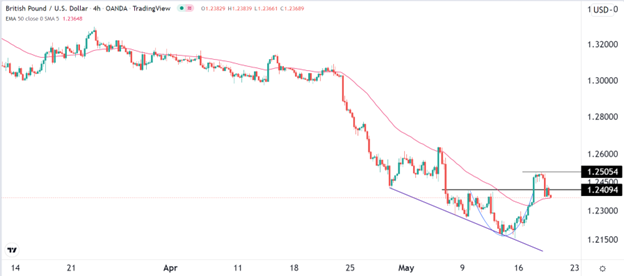Bullish View
- Buy the GBP/USD pair and set a take-profit at 1.2500.
- Add a stop-loss at 1.2300.
- Timeline: 1 day.
Bearish View
- Set a sell-stop at 1.2320 and a take-profit at 1.2250.
- Add a stop-loss at 1.2420.
The GBP/USD pair pulled back on the back of a stronger US dollar as global risks rose. The pair also declined after the strong inflation data from the United States. It is trading at 1.2388, which is slightly below this week’s high of 1.2500.
Strong UK Data
The GBP/USD pair declined even after the strong economic data from the UK. Data published on Tuesday revealed that the country’s labor market is tightening at a relatively faster pace. The unemployment rate declined to a record low while wages held steady.
On Wednesday, data by the ONS revealed that consumer inflation surged to the highest level in over 40 years. The headline CPI rose to 9% as the price of oil and gas surged due to the crisis in Ukraine. Excluding the volatile food and energy prices, consumer prices rose by 6.2% on a year-on-year basis.
Therefore, the GBP/USD pair declined because these numbers were lower than what most analysts were expecting. The median estimate for the headline CPI was 9.1%.
Additional data revealed that companies are paying more for their inputs. The PPI input increased to 18.6% while the PPI output rose to 14.0%.
The pair also declined because of the strong US dollar a global risks rose. There are risks about the decision by Finland and Sweden to join Nato. Investors expect that these moves could lead to more geopolitical tensions in the region.
There are also corporate risks after major retailers warned about margins. Walmart, Lowe’s, and Target said that they were seeing elevated inflation risks. As a result, their shares declined by more than 20%. These are notable companies because they provide a feel of the American consumer. The key data to watch today will be the Philadelphia manufacturing index and initial jobless claims.
GBP/USD Forecast
The GBP/USD pair rose to a high of 1.5000 and then pulled back. On the four-hour chart, the pair managed to decline below the important support level of 1.2410, which was the highest point on May 9th. It is slightly above the 50-day moving average. A closer look shows that the pair has formed a rounding bottom pattern.
Therefore, the pair will likely resume the bullish trend later on Thursday. If this happens, the next key resistance level to watch will be at 1.22500. A drop below the support at 1.2300 will invalidate the bullish view.

